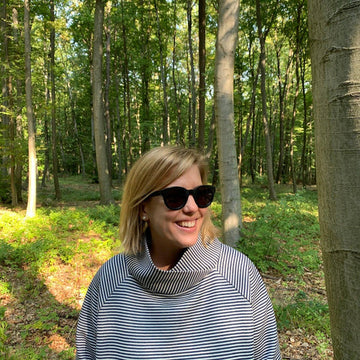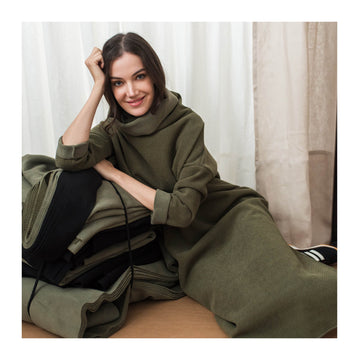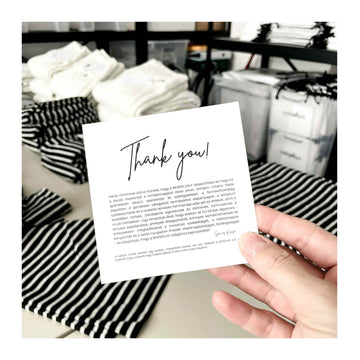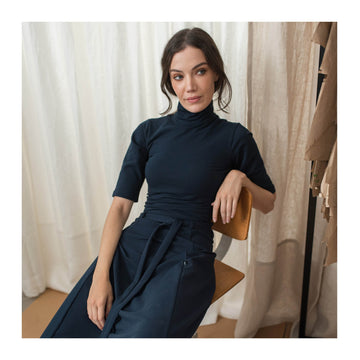Anna Ott is a full-time reader and cultural organizer in the coolest sense of the word: She is the artistic director of Hadik , one of the main organizers of the Margó Literary Festival , and since September this year has been a lecturer at METU. She also writes regularly for Könyves Magazin and Elle Magazin, and leads literary walks and discussions. She is probably also the owner of the most popular Hungarian literature-themed Instagram page , within the framework of which she created a fantastic, marathon reading club in cooperation with Jelenkor Kiado - for more than three months now we have been reading Péter Nádas's great novel Parallel Stories together , which can provide every reader with a special and unrepeatable literary experience.
We talked to Anna about her career, style, dressing, free time and, of course, reading. Enjoy our interview!
- How did you become a reader and what does reading mean to you?
- As a child and teenager, I read to escape reality. In my TED talk, I said this about reading, and I can't possibly put it any better: "It's a resource. It's not a hobby, it's not a fad, it's not a pose, it's not a like magnet, for me reading is a resource. A resource that I can come back to at any time, I can sit down and drink in, I can immerse myself in it. In the power that I get while reading." And the greatest luck and the greatest pride for me is that this resource is now also my work.
- What does your workday look like, how can you balance your various activities?
- I try to organize my days as efficiently and transparently as possible a week in advance. The mornings are spent at home, at this time I sit down in front of my computer and write articles, longer-form materials, and answer emails, because I am most focused in the morning. Then come the meetings during the day, lately the evenings are also full of work, or I hold literary discussions or literary walks. Since I work in several places, it helps if I also schedule the days of the week, so I Margózom on Monday, I teach at the university on Tuesday, Wednesday and Thursday are Hadikos days, and I read on Friday. This line pattern sounds nice, but in reality it often disrupts my plans.

- With all the different tasks, when do you have time to read? Do you have a special reading time that is sacred and inviolable?
- I can't read during the day because my brain is constantly racing, the phone is ringing and emails are coming in, and by the evening I'm usually really tired. So I prefer to read in the morning, I get up an hour earlier, so I have time to read in peace and quiet. I recommend this to everyone who can, because the day starts completely differently. Weekends are also for reading and in this respect I've remained a child, during the winter break and summer break I have time for really great reading experiences.
- Where and how do you like to spend your free time, how do you recharge after a long week?
- I grew up in Szentendre, so the small town and proximity to nature were always important, but in recent years the emphasis has shifted to work and achievement. We spent most of the quarantine in Mecsek, which we couldn't have made a better decision. It was difficult to get back, so we vowed to spend as much time as we could there. From Friday morning to Sunday evening we are in the forest, with lots of books and our two dogs. Only here can I really relax and recharge. These days are spent in a completely different rhythm than in Budapest, we go to bed at dusk, get up at sunrise, read in the fresh air all day, go hiking and eat. This is exactly what the day consists of, so we can regain the energy that we burn and use up five days a week with rushing, stress and work.


- What characterizes your style and how do you express it in your clothing?
- My clothes reflect my mood every day, I really like this game of self-expression. In recent years, it has become increasingly important that what I wear has a story, is a timeless piece, that I know the designer, and that I agree with the brand's credo. I have fewer and fewer clothes, but the ones I have left, the ones I have newly acquired, are ones that, in the best case, even my child will be able to wear, because they don't go out of fashion and don't fall apart in a season. I have one obsession that won't subside, although I try to keep myself in check: I'm addicted to bags. In many cases, the bag is almost the only thing that dresses me.
- What is more important to you, comfort or elegance, practicality or style - do you even have to choose or decide between these?
- In everyday life, the most important thing is stylish comfort and practicality. I can't stand a day, or perhaps even an hour, in clothes that are tight, that I have to be afraid of, that I have to behave in. My dogs also play a big role in this, I usually go to work with them and between two jobs I can easily fit in an hour spent in the forest or a long walk on Gellért Hill. When I appear in a literary program, of course I enjoy being able to dress up a little, but I don't compromise on elegance either, it's also very important that the clothes are easy to wear and comfortable.

- How did you get in touch with NON+ and what was the meeting like?
- An old Hadikos colleague and friend of mine started working at NON+ after the café, so meeting him was a great pleasure. I visited him in the showroom, where I also met Saci, and I couldn't get away from the clothes for hours, I wanted to try on all of them. I can honestly say that I've probably never worn clothes that were so comfortable. I asked Saci why she started at NON+, and she replied that she couldn't find the comfortable clothes she wanted anywhere, so she made them for herself. When she said that, I knew I was in the best place.
- What is your most exciting project at the moment and what are you currently working on?
- During the quarantine, I decided to read Péter Nádas' novel Parallel Stories and I also decided that I would like to encourage others to do the same. So the idea turned into a joint reading , where we progress through the story one hundred pages a week and talk about it online every week in the company of a literary critic, aesthete, and writer. This story has been defining my days for thirteen weeks, it will be very difficult without it. I am preparing for its conclusion and climax, and on top of that, I am also teaching at a university for the first time this year, which is also a huge challenge and a great adventure. In October, we will hold the Margó Literary Festival and the literary programs of Hadik have begun, organizing these and preparing for the conversations will fill my days in the fall.





